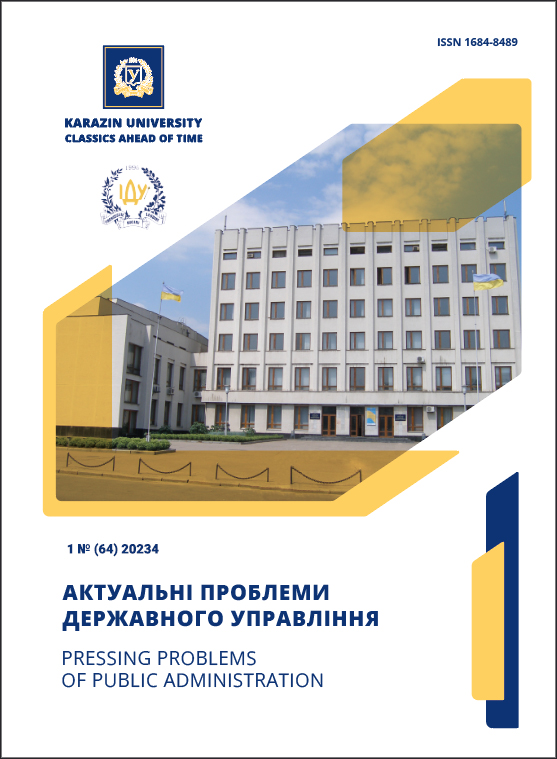Efficiency of Multi-Level Governance and Common EU Security and Defence Policy under Conditions of Hybrid Threats
Abstract
The article substantiates and proves that the focus on the implementation of the common policy and global strategies of the EU regarding the construction of a new European model of multi-level governance, strategic security and stability requires both the agreement of all decision-making subjects and ensuring their effectiveness in the conditions of global influences and hybrid threats. For the first time, the main provisions of the three-level conceptual model of rationalization of multi-level management are formulated and its use in the implementation of European security and defense policy in the context of hybrid threats is formulated, taking into account the relevant elements of sequence in the formation and implementation of public policy, which can significantly optimize the determination of the degree of integration by an individual participating country , willingness to invest and the ability to develop a specific strategic direction within the EU, as well as other ways and means of achieving its goals, algorithmization and demonstration of a step-by-step algorithm for solving complex problems to the subjects of implementation of programs and projects, as components of a complex coordination mechanism in the system multi-level management. Emphasis is placed on increasing the effectiveness of the implementation of the common security and defense policy of the EU in the conditions of hybrid threats and the need to introduce an integrated approach to ensure the national stability of European countries based on the concept of multi-level management, taking into account the global strategies of the EU.
Downloads
References
Andrushenko, S. (2011). International political security. In Political Encyclopedia. Kyiv: Parliamentary Publishing House, 52–53. [in Ukrainian].
Dorosh, L., & Romanik, V. (2020). PESCO, CARD, EDF: Strategy, analysis and financing in the field of ensuring the security of the European Union. Humanitarian Visions, 6 (1), 1–7.
DOI: 10.23939/shv2020.02.001 [in Ukrainian].
Kopiika, V.V., Makovsky, S.O., & Myronova, M.A. (2021). European Union in international relations: A training manual. Kyiv: VPC “Kyiv University”. 560 p. [in Ukrainian].
Zavada, Y., & Sino, I. (2022). Common Security and Defense Policy of the EU at the modern stage: Main perspectives and threats. Politikus, 3, 71–76. [in Ukrainian].
Melnik, O. (2022). New security model in Europe: How will the “compass” strategy help Ukraine? Kyiv. URL: https://razumkov.org.ua/statti/nova-model-bezpeky-vyevropi-chym-dopomozhe-ukraini-strategiia-kompas [in Ukrainian].
Joint declaration of the Ministers of Foreign Affairs of Ukraine, the Republic of Poland and the Republic of Lithuania on the establishment of the “Lublin Triangle”. Government portal. (2020). URL :http://surl.li/lhqvfl [in Ukrainian].
Suvorov, V.P. (2023). Coordination as a mechanism for implementing the concept of multi-level governance in Ukraine. Theory and Practice of State Governance, 2(77), 54–69.
DOI: 10.26565/1727-6667-2023-2-04 [in Ukrainian].
Suvorov, V.P. (2023). Transformation of multi-level governance based on global strategies of the EU and national resilience of Ukraine in the face of hybrid threats. State Building, 2 (34), 183–196. DOI: 10.26565/1992-2337-2023-2-15 [in Ukrainian].
Khylyk, O.L. (2022). European Union in a changing world: Monograph. Kyiv: Zen’O. 219 p.
[in Ukrainian].
European Defence Fund: Factsheet 2019. Brussels: European Commission. (2019).
URL: https://ec.europa.eu/docsroom/
The European Centre of Excellence for Countering Hybrid Threats (Hybrid CoE).
The European Union’s global strategy. Three years on, looking forward. (2019).
URL: https://eeas.europa.eu/sites/default/files/eu_global_strategy_2019.pdf
Fiott, D. (2017). The CARD on the EU defence table. European Union Institute for Security Studies (EUISS). Berlin. URL: https://www.iss.europa.eu/sites/default/files/euissfiles/alert_10_card_0.pdf
Peters, B.G. (2018). The challenge of policy coordination. Policy Design and Practice, 1 (1), 1–11. DOI: 10.1080/25741292.2018.1437946
Karamyshev, D.V. (2018). Dominants of global governance in dimensions of global development. Theory and Practice of Public Administration, 4, 8–20 [in Ukrainian].
Karamyshev, D., Suvorov, V., & Sobol, R. (2024). Overcoming systemic vulnerabilities of the spheres of influence of hybrid threats in ensuring stability and comprehensive security in the conditions of European integration. Public Administration and Regional Development, 24, 628–647. DOI: 10.34132/pard2024.24.14 [in Ukrainian].
Morrison, T. (2002). Actionable learning: A handbook for capacity building through case-based learning. Tokyo: Asian Development Bank Institute. 515 p.
Permanent Structured Cooperation (PESCO): URL: https://www.pesco.europa.eu/binding-commitments/
Shared Vision, Common Action: A Stronger Europe. A Global Strategy for the European Union’s Foreign And Security Policy. (2016, June). URL: http://surl.li/ptqqil
A Strategic Compass for Security and Defence. (2022). URL: http://surl.li/bjxpbc

